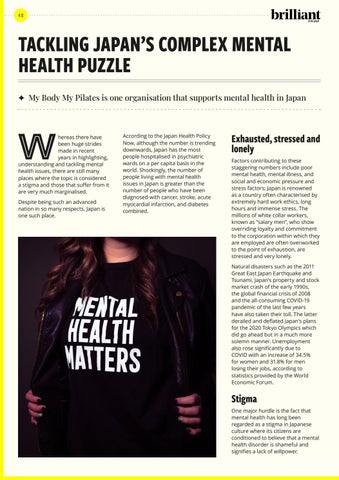48
TACKLING JAPAN’S COMPLEX MENTAL HEALTH PUZZLE ✦ My Body My Pilates is one organisation that supports mental health in Japan
W
hereas there have been huge strides made in recent years in highlighting, understanding and tackling mental health issues, there are still many places where the topic is considered a stigma and those that suffer from it are very much marginalised. Despite being such an advanced nation in so many respects, Japan is one such place.
According to the Japan Health Policy Now, although the number is trending downwards, Japan has the most people hospitalised in psychiatric wards on a per capita basis in the world. Shockingly, the number of people living with mental health issues in Japan is greater than the number of people who have been diagnosed with cancer, stroke, acute myocardial infarction, and diabetes combined.
Exhausted, stressed and lonely Factors contributing to these staggering numbers include poor mental health, mental illness, and social and economic pressure and stress factors; Japan is renowned as a country often characterised by extremely hard work ethics, long hours and immense stress. The millions of white collar workers, known as “salary men”, who show overriding loyalty and commitment to the corporation within which they are employed are often overworked to the point of exhaustion, are stressed and very lonely. Natural disasters such as the 2011 Great East Japan Earthquake and Tsunami, Japan’s property and stock market crash of the early 1990s, the global financial crisis of 2008 and the all-consuming COVID-19 pandemic of the last few years have also taken their toll. The latter derailed and deflated Japan’s plans for the 2020 Tokyo Olympics which did go ahead but in a much more solemn manner. Unemployment also rose significantly due to COVID with an increase of 34.5% for women and 31.8% for men losing their jobs, according to statistics provided by the World Economic Forum.
Stigma One major hurdle is the fact that mental health has long been regarded as a stigma in Japanese culture where its citizens are conditioned to believe that a mental health disorder is shameful and signifies a lack of willpower.



















